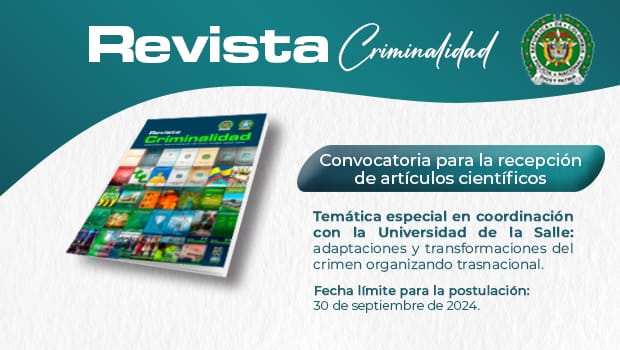POLICÍA NACIONAL DE COLOMBIA
Invitations
Call for papers for Revista Criminalidad 67 – 1
Special topic: adaptations and transformations of transnational organized crime
Guest editors of Universidad de la Salle
Carlos Alfonso Laverde Rodríguez
Lorena Andrea Erazo Patino
Emerson David Devia Acevedo
Revista Criminalidad, as a benchmark for the publication of rigorous and high-quality studies in the field of criminological research developed with multidisciplinary approaches, announces its special issue framed in the "Adaptations and transformations of transnational organized crime".
Transnational organized crime (TOC) is one of the most urgent challenges to international security due to its economic and social impacts, as well as the threat it poses to state sovereignty. This problem is particularly acute in the countries of Latin America and the Caribbean, where there is a growing number of TOC activities, which have gained increasing influence in the region.
Aspects such as social norms and historical power relations in each state are part of a complex articulation of criminal organizations that have expanded in different ways and with varied impacts around the world. In this context, migration crises, changes in global economic dynamics, technological progress and new forms of cybercrime have been combined with structural problems of effective response by States, either due to the lack of knowledge of the new actors and their modalities, or due to the co-optation of certain State sectors that have facilitated the insertion of crime within the State.
This issue of Revista Criminalidad, the first of volume 67, will offer an empirical exploration, with research of high academic quality and methodological rigor, providing new perspectives on the development of transnational organized crime. It analyzes their new logics of development and operation, the articulation with political and social conjunctures of the region such as migration, as well as the new global economic dynamics that have provided fertile ground for the diversification of criminal dynamics.
Topics of Interest
Interested parties are invited to address, among others, the following topics:














